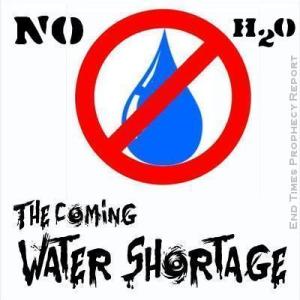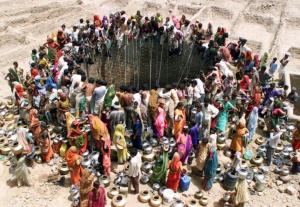THE COMING U.S. WATER SHORTAGE: LATEST DIRE PREDICTIONS. The next shortage for the United States that some predict? Oil? Gold? Food? How about water.
Water is essential to all living organisms. In order to eat we need water. If we do not have water we will die and this is what we are seeing happen within, “a fifth of the world’s population—1.2 billion people—live in areas experiencing ‘physical water scarcity’ or insufficient supplies for everyone’s demands…” A United Nations task force has warned us that roughly 3 billion people will be affected by “water stress conditions” by the year 2025. (CQ Researcher, 2010) That’s only 11 years away. Think about it this way, if you have a son or daughter that was born this year by the time they turn 11 they could very well be one of the 3 billion people affected. Many nonprofit organizations are trying to sustain our children’s basic human right to access water by helping solve world water problems.
Heifer International plays a vital role in solving our water crisis. According to the Heifer International article “Why Water Matters”, the organization discusses the reasons why water is vital to life an offers the Millennium Declaration which focuses on acceptable sanitation facilities in order to stop diseases related to hazardous drinking water. (Why Water Matters. June 2008)
Water Our Thirsty World also plays a significant role in investigating and providing critical key solutions to this epidemic by providing chlorination systems to people living in North Africa, the Middle East and Asia. These systems are low-cost and economical, sturdy and very simple to operate. “Drinking water chlorination has helped to virtually eliminate waterborne diseases in the United States over the past century. (The solution: a device that produces chlorine. 2010)
Jumping back a bit to the term, “water stress”, the United Nations used this term to describe the result of disproportion between “water use and water resources”. (Water Crisis. 2010) For example, your child wants to fill their pool up with water to go swimming outside in the back yard but cannot because the demand exceeds the actual available amount during that particular time so little Johnny or little Jenny cannot swim because there is no water. Now, let’s think of this in terms of cooking. Think about a dinner you make for your family or for yourself that’s somewhat traditional; it could be simple or elaborate. Now think about how much water it takes to actually make the food you prepare. According to UN World Water Day, “It takes about 1500 liters of water to produce 1 kg of wheat, but it takes 10 times more to produce 1kg of beef!”(World Water Day. 2012) Essentially if beef or wheat is involved in your traditional meal while there is a water shortage your demand for that particular food exceeds the actual available amount therefore you will have a hard time finding anything to eat because water is the primary source for the production of our food.
This leads me to ask if water is a basic human right. Looking at the water crisis globally leads us to believe that it is a basic human right. It should not be a crime to be poor. The poorest populations in Africa and Asia should not have to suffer because of where they were born. They also should not have to die because of the lack of simple sanitation methods. U.N. World Water Day acknowledges the health benefits of using fresh water and celebrates the sustainment of the resources. Their website has tons of information in regards to campaign events, worldwide events and frequently asked questions. It’s a great site to get familiar with the water crisis.
The U.N. Secretary spoke in 2008 on World Water Day (March 22) concerning the water crisis. “While there have been advances, progress is hampered by population growth, widespread poverty, insufficient investments to address the problem and the biggest culprit: a lack of political will.” (SECRETARY-GENERAL, IN MESSAGE FOR WORLD WATER DAY, CALLS LACK OF POLITICAL WILL BIGGEST CULPRIT IN FAILURE TO ACHIEVE BASIC SANITATION GOAL. 5 Mar. 2008.) The causes of water shortage range from water misuse to wasting however I believe the U.N. Secretary is correct in his effort to solve the problem once and for all through political will.
What does a water shortage mean? Refer to the picture below.
(Water Shortage. People gather to get water from a huge well in the village of Natwarghad in the western Indian state of Gujarat. REUTERS)
The conflicts created during a water shortage can be anywhere from minor to major. “Water resources are rarely the sole source of conflict, and indeed, water is frequently a source of cooperation.” (CQ Researcher, 2010) But what can happen when water runs out? Ismail Serageldin has worked with the World Bank since 1972 and had this to say concerning water conflicts, “If the wars of this century were fought over oil, the wars of the next century will be fought over water.” (Otis, Ginger A. The Village Voice. 20 Aug. 2002) 2003’s gruesome conflict in Darfur, Sudan left 400,000 Africans dead partly due to a stressed depleting water resources. (Borger, Julian. The Guardian. 27 Apr. 2007)
In order to solve the water crisis one must look at solutions on two levels- micro and macro. One way to help conserve water would be to eliminate wasted water. Do you have a leaky faucet or constant running toilet water? Get those things fixed. Shut off tap water while brushing your teeth. If you eat meat, eat less of it and if you drink coffee switch to tea. In order to find your water footprint visit Water Footprint here: http://www.waterfootprint.org/?page=cal/waterfootprintcalculator_indv. My score was 1054.
On a macro level it would be wise to contact your representatives and request they become involved with solving this crisis. Ask them to require all local retailers to provide consumers with the right information to make good decisions on purchases and petition for product transparency. On a macro level we need regulations from our government in order to stop the waste and preserve our water for everyone and not just a select few.
Cited
Borger, Julian. The Guardian. 27 Apr. 2007. 26 May 2012 <http://http://www.guardian.co.uk/environment/2007/apr/28/sudan.climatechange>.
Hoeastra, Arjen Y and Ashok K. Chapagain. Water Footprint. 2012. 26 May 2012 <http://http://www.waterfootprint.org/?page=cal/waterfootprintcalculator_indv>.
Otis, Ginger A. The Village Voice. 20 Aug. 2002. 26 May 2012 <http://http://www.villagevoice.com/2002-08-20/news/a-world-without-water/
SECRETARY-GENERAL, IN MESSAGE FOR WORLD WATER DAY, CALLS LACK OF POLITICAL WILL BIGGEST CULPRIT IN FAILURE TO ACHIEVE BASIC SANITATION GOAL. 5 Mar. 2008. World Water Day. 26 May 2012 <http://http://www.un.org/News/Press/docs/2008/sgsm11451.doc.htm>.
The solution: a device that produces chlorine. 2010. 26 May 2012 <http://http://www.ourthirstyworld.org/who-we-are>.
Water Crisis. 2010. 26 May 2012 <http://http://www.worldwatercouncil.org/index.php?id=25>.
Women gather at well to collect water. India. N.p.: Reuters, 2009.
Why Water Matters. June 2008. United Nations “Water for Life Decade“. 26 May 2012 <http://http://www.heifer.org/site/c.edJRKQNiFiG/b.4170865/>.
World Water Day. 2012. 26 May 2012 <http://http://www.unwater.org/worldwaterday/faqs.html>.

